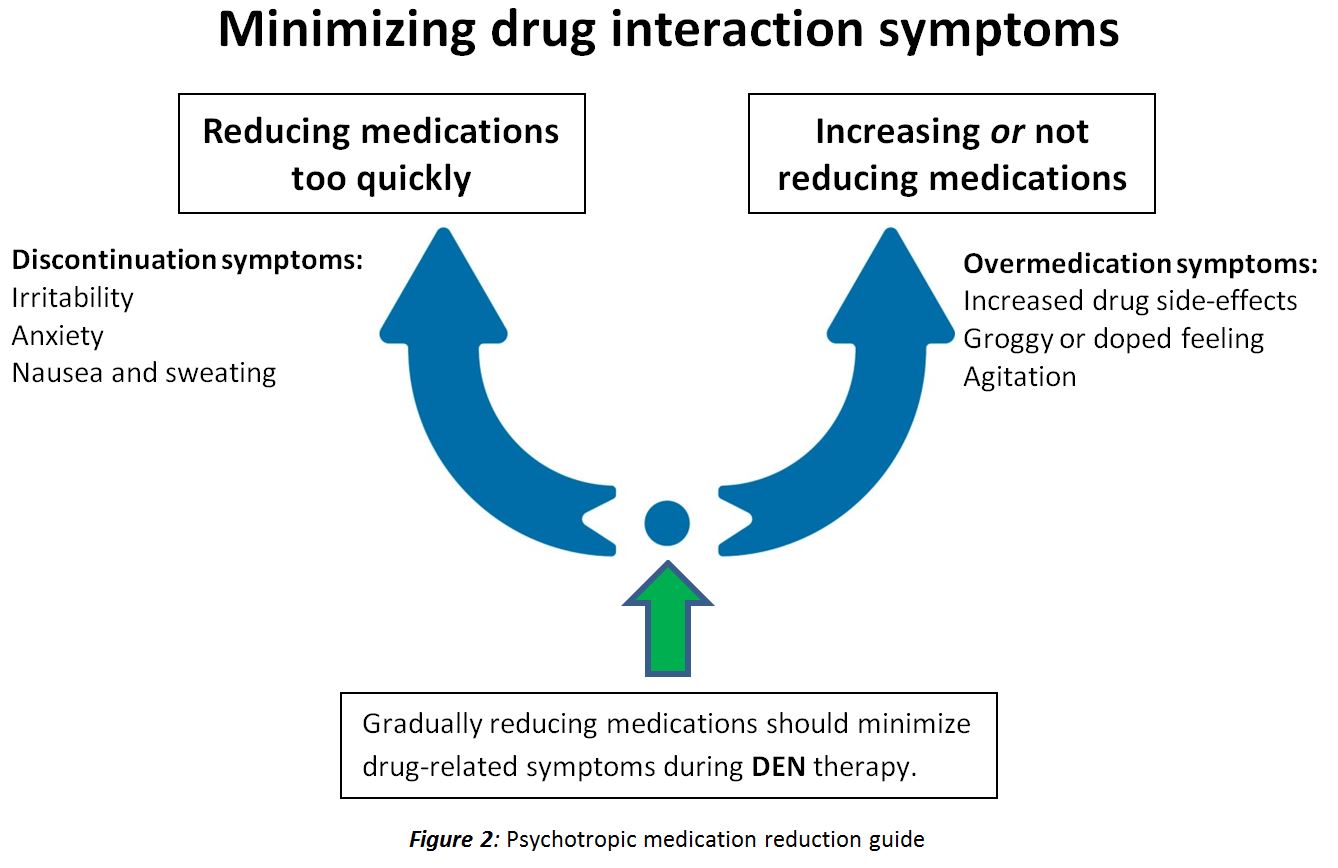entitled "Single and Broad-Spectrum Micronutrient Treatments in Psychiatric Practice" (Gerbarg, Muskin, & Brown, American Psychiatric Association Publishing, 2017) states the following:
"The treatment of individuals who are already taking CNS drugs is considerably more complicated. Transitioning from conventional medications to micronutrients involves a cross-tapering process, during which
clinically prominent drug-nutrient interactions usually emerge. This transitioning process can be difficult because of 1)
potentiated psychiatric drug side effects; 2) increased psychiatric symptoms as drug doses are tapered down; 3)
potentiated, protracted, or delayed drug discontinuation symptoms (including anxiety); and 4) situational anxiety that accompanies the transition...
It is strongly advised that clinicians obtain training and/or supervision before attempting to transition patients taking conventional psychiatric medications to broad-spectrum micronutrients. Individuals who consume caffeine, nicotine, alcohol, or recreational drugs may also notice interactions with broad-spectrum micronutrients. People who ingest large amounts of these substances (e.g., four cups of coffee daily, marijuana twice weekly) are likely to notice weaker therapeutic effects of micronutrients...
(emphasis added)
"Initial evaluation of patients includes standard psychiatric evaluation, medication history (duration and last use of CNS-active agents, marijuana, other recreational drugs, caffeine, alcohol, nicotine), assessment of the individual's willingness to reduce his or her usage of these drugs, contraindications (Candida infection, prostate cancer), and antibiotic usage...
"...informed consent may include explicit statements that...5) adverse effects include potential worsening of Candida infections...7)
nutrient interactions with psychiatric and nonpsychiatric medications can occur; 8) t
he prescriber should be contacted when starting any new drug, especially an antibiotic; and 9) reducing or preferably stopping recreational drugs, caffeine, alcohol, and smoking will enhance treatment effectiveness and safety...If transitioning a patient from psychiatric drugs, the medical record should explain the reason each time a psychiatric drug dose is lowered, such as adverse effects detected, withdrawal symptoms, or other specific clinical observations in the individual patient;
it is not sufficient to appeal to a general protocol... (emphasis added)
"...broad-spectrum micronutrients appear to potentiate virtually all CNS-active drugs."
Health professionals should feel free to call (855) 955-1114 to consult with our science team. We have gleaned some very valuable insights into the clinical management of such situations from doctors who have reported back to us their experiences.
2) Digestive health cannot be overlooked as a powerful modulator of response to oral micronutrient therapy
Extensive clinical experience has revealed that, second only to medication interactions, bowel dysfunction (including microflora dysbiosis) is the primary cause of poor outcomes using Daily Essential Nutrients. It appears that Daily Essential Nutrients (DEN) acts almost like a magnifier of whatever microbiome setting exists prior to micronutrient supplementation, for better or worse.
You may have noticed the following interspersed with the discussion of medication interactions in the above excerpts from Complementary and Integrative Treatments in Psychiatric Practice
"...adverse effects include potential worsening of Candida infections..."
"...the prescriber should be contacted when starting any new drug, especially an antibiotic..." (emphasis added)
As substantiation for the warning about yeast infections, a link to a published case study documenting micronutrient exacerbation of a confirmed Candidiasis infection can be found on the Hardy Nutritionals
. The patient responded positively to micronutrients only after antifungal treatment had first addressed the Candida problem:

